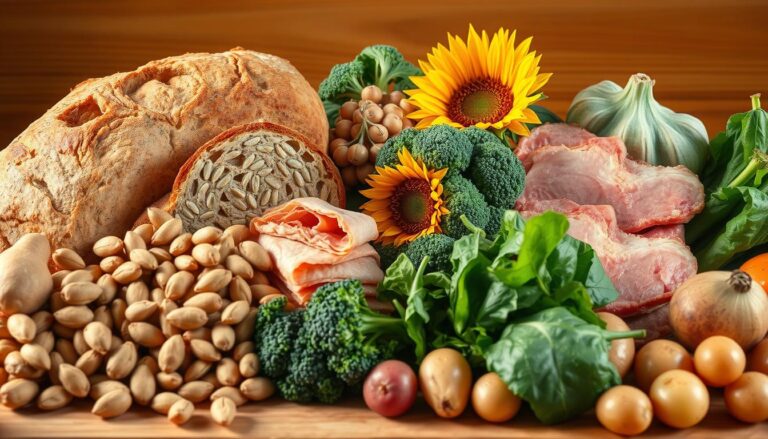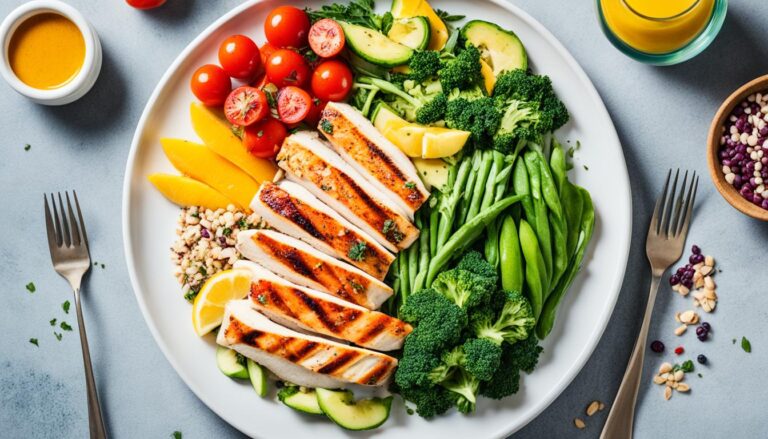Choosing the right diet can be tough with so many options. The best meal plan for losing fat should help you burn fat stay healthy and meet your personal goals.
A good fat burning meal plan can also lower your risk of chronic diseases and make you live longer.
Studies show that diets like the Mediterranean diet can lead to more weight loss and better health than low fat diets. The DASH diet also helps lower blood pressure and heart disease risk. By using these diet principles in your meal plan, you can lose fat for good and feel better overall.
Understanding the Importance of Fat Loss
It’s key to lose fat to stay healthy, avoid chronic diseases, and feel good. A good fat-burning meal plan should include lots of fruits, veggies, whole grains, and lean proteins. These foods help you burn fat and lose weight effectively.
Key Takeaways
- A fat-burning meal plan should be tailored to an individual’s specific needs and goals.
- Certain diets, such as the Mediterranean diet, can promote greater weight loss and improved health outcomes.
- Incorporating a variety of healthy foods into a meal plan can support optimal fat burning and weight loss.
- A well-structured meal plan can help reduce the risk of chronic diseases and improve metabolic health.
- It typically takes 1 to 2 weeks to ease into a new dieting habit, and scheduling a cheat meal every 7 days can help maintain motivation.
- Protein drinks and bars can help curb sugar cravings and support weight loss.
Understanding the Science of Fat Loss
The body burns fat through a process called metabolism. This is how fast the body uses calories. When the body uses more calories than it gets, it loses weight. This is called a caloric deficit.
Metabolism is key for losing weight. It’s the rate at which the body uses calories to burn fat. A caloric deficit happens when the body uses more calories than it gets, leading to weight loss.
The body burns fat through a process called metabolism. This is how fast the body uses calories. When the body uses more calories than it gets, it loses weight. This is called a caloric deficit.
Diet and nutrition play a big role in weight loss. Eating a variety of healthy foods helps. Foods like fruits, vegetables, whole grains, and lean proteins are good choices.
The body burns fat through a process called metabolism. This is how fast the body uses calories. When the body uses more calories than it gets, it loses weight. This is called a caloric deficit.

Essential Nutrients for Optimal Fat Burning
To lose weight and burn fat well, you need a good meal plan. This plan should include important nutrients. These nutrients help your body work right and support losing weight.
Protein, healthy fats, and complex carbs are key. They help burn fat and keep you healthy. A meal plan with these can help you lose weight and keep it off.
For example, a 7 day meal plan with 1,500 calories a day is good. It should have at least 58 grams of protein and 29 grams of fiber. Foods like whole grains, lean proteins, and healthy fats can also help lose belly fat.
Here are some important nutrients and their benefits:
- Protein: helps keep lean body mass while losing weight
- Healthy fats: good for heart health and gives lasting energy
- Complex carbohydrates: full of fiber, vitamins, and minerals
Adding these nutrients to your meal plan helps with weight loss and fat burning. Remember, your meal plan should fit your calorie needs. There are options for different calorie needs.
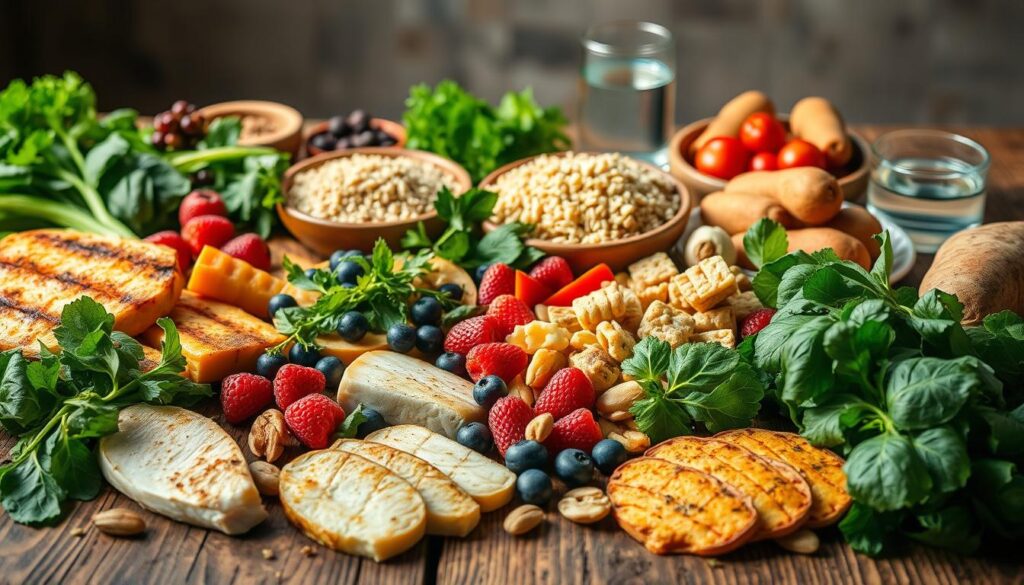
What Is the Best Meal Plan to Lose Fat?
A good meal plan is key for losing weight. For fat burning tips, eating a variety of whole foods is important. A 7 day meal plan can help you lose weight. Make sure to include fruits, vegetables, whole grains, and lean proteins.
To lose weight effectively, aim for a 500-calorie deficit daily. This means losing about 1 pound a week. A 1,500-calorie diet is good for many, with each meal around 500 calories. Diet tips like portion control and meal timing are also important.
Here are some key considerations for a successful meal plan:
- Balance macronutrient distribution
- Control portion sizes
- Time meals strategically

By following these fat burning tips and weight loss tips, you can make a meal plan that fits your needs. Stay hydrated eat a variety of whole foods, and exercise regularly. This will help you lose weight and stay healthy.
Creating Your Custom Fat Burning Menu
A good nutrition plan is key to losing weight. By eating healthy and planning meals, you can make a menu that works for you. A 1,200-calorie diet, for instance, can help you lose weight. It should include fruits, veggies, whole grains, and lean proteins.
When making your menu, meal planning is vital. It means planning and preparing meals ahead to get the right nutrients. A good diet should have protein, healthy carbs, and veggies. Also, drink lots of water, aiming for 2-4 cups in the morning to boost your metabolism.
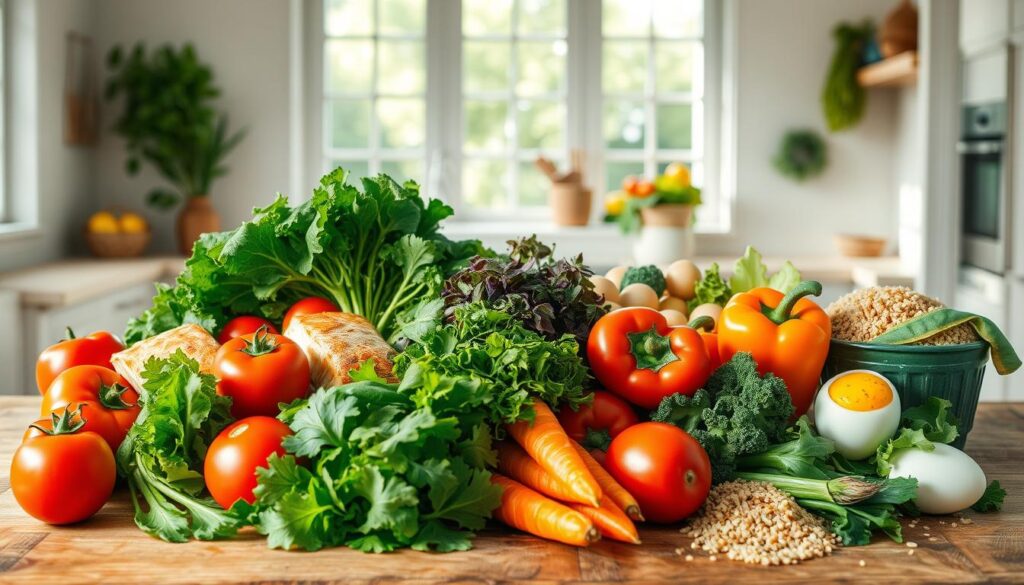
- Eat every 3-4 hours to keep metabolism engaged
- Incorporate a variety of healthy recipes to prevent diet fatigue
- Plan for snacks to prevent unplanned, unhealthy choices
By following these tips and making a personalized nutrition plan, you can reach your weight loss goals. And keep your diet balanced and healthy.
Strategic Meal Prep for Weight Loss Success
Meal prep is key for weight loss success. A good diet plan keeps you on track with healthy meals. It supports both healthy eating and exercise, helping you lose fat.
Focus on whole foods like fruits, veggies, grains, lean proteins, and healthy fats. These foods make a diet for weight loss effective and lasting. For instance, a meal prep plan might include:
- Grilled chicken breast with roasted vegetables
- Salmon with quinoa and steamed broccoli
- Lentil soup with whole grain bread
Following a meal prep plan helps you reach your weight loss goals. It’s important to make a plan that fits your needs and likes. Meal prep is a great way to succeed.
Meal prep also saves time and money and cuts down on waste. It ensures you eat well, even when you’re busy. Strategic meal prep is essential for losing weight and staying healthy.
Superfoods That Accelerate Fat Burning
For weight loss, some superfoods can really help. They can make your body burn fat faster. Adding these foods to your meals can give you diet advice for a healthier life. Studies show that green tea, lean proteins, and fatty fish are great for losing weight.
Having a meal plan with these superfoods can help you reach your weight loss goals. Here are some examples of superfoods that can help:
- Green tea, which can promote weight loss through fat burning
- Lean proteins, such as chicken and fish, which can help build muscle and increase metabolism
- Fatty fish, such as salmon, which are rich in omega-3 fatty acids and can support heart health
It’s also key to follow nutrition advice on portion control and balanced nutrients. A healthy diet, regular exercise, and a balanced lifestyle can help you lose weight and stay healthy.
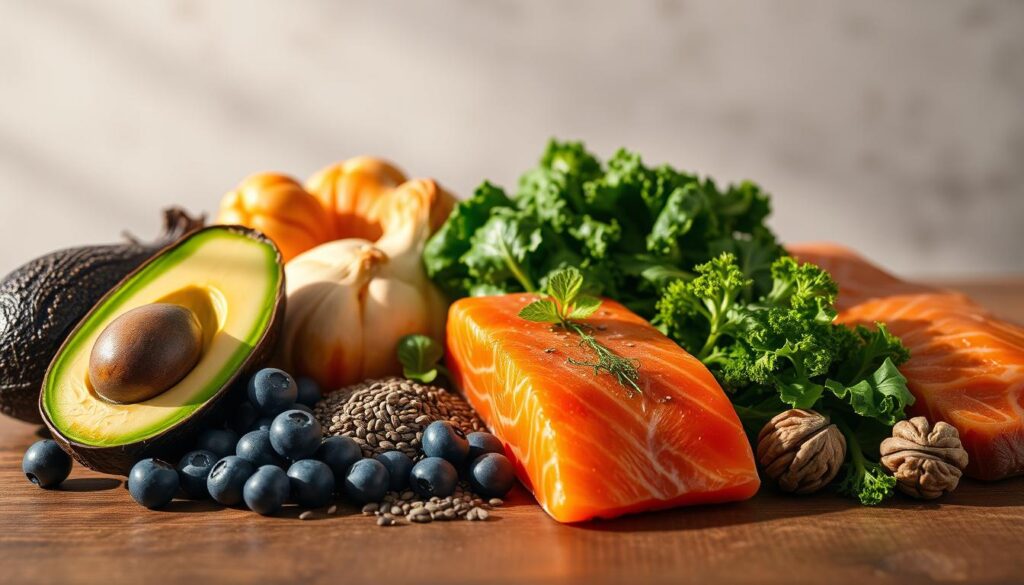
Avoiding Common Diet Pitfalls
When trying to lose weight, meal planning tips are key. A good meal plan helps you avoid bad habits like eating too little or being too hard on yourself. Skipping breakfast can make you hungrier later, leading to more snacks and bigger meals.
Healthy eating tips, like eating small meals and snacks, can help control hunger. Also, staying hydrated and getting enough calcium are important for a good diet. It’s important to watch out for pitfalls like snacking without thinking drinking too many calories, and setting goals that are too high.
Here are some ways to avoid diet pitfalls:
- Eating a balanced breakfast to control hunger throughout the day
- Being mindful of portion sizes and calorie intake
- Staying hydrated to support metabolism and overall health
- Avoiding high-calorie beverages and snacks
By following these meal planning tips and healthy eating tips, you can succeed in your diet. Don’t forget to learn about weight loss tips to help you on your journey to a healthier life.
Combining Your Meal Plan with Exercise
To reach your weight loss goals, it’s key to mix a healthy meal plan with regular exercise. Research backs this up, showing that diet and exercise together help with weight loss. A 1,500-calorie meal plan, for instance, includes breakfast, lunch, dinner, and a snack. This can help you feel full longer and aid in weight loss.
Here are some fat loss tips for mixing your meal plan with exercise:
- Timing your workouts and meals is important for muscle growth and recovery.
- Pre and post-workout meals should have protein, complex carbs, and healthy fats.
- Drinking plenty of water is also key for better physical performance and health.
Also, eating low energy density foods, like those high in fiber and water, can aid in weight loss. The Mediterranean and DASH diets are excellent examples of healthy meal plans for weight loss. By following these diet tips and exercising regularly, you can lose about 5% of your body weight. This can greatly improve your health.
For a realistic weight loss plan, aim to lose 1 to 1.5 pounds a week by cutting 500 calories daily. Healthy adults need at least 150 minutes of moderate aerobic activity or 75 minutes of vigorous aerobic activity weekly. By combining a healthy meal plan with regular exercise and these nutrition tips, you can reach your weight loss goals and stay healthy.
Conclusion Your Path to Sustainable Fat Loss
Getting lasting weight loss and healthy living needs a full plan. This includes a smart nutrition plan, regular workouts, and a positive attitude. We’ve looked into how fat burning works, the best nutrients for losing weight, and what makes a good fat-burning meal plan.
You now have the tools to make a diet that helps you lose weight. Remember losing fat takes time, so be patient and keep going. Aim for a small calorie cut, eat lots of whole foods, and drink plenty of water and stay active.
Your journey to being healthier and leaner is ongoing. Accept the lifestyle changes, celebrate your small wins, and don’t hesitate to get help from doctors or online groups. With hard work and determination you can reach your weight loss goals and keep living healthily for many years.


